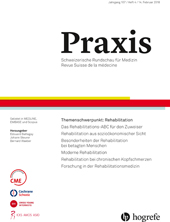Rehabilitation: Das ABC für den Zuweiser
Abstract
Zusammenfassung. Die ärztlich durchgeführten oder angeordneten Massnahmen der medizinischen Rehabilitation sind nach KVG eine Pflichtleistung der sozialen Krankenversicherung. Nach der Diagnosestellung nach ICD-10 sollten die funktionellen Defizite nach ICF abgeleitet werden. Sind diese Defizite voraussichtlich länger bestehend und sollten sie sich durch Rehabilitationsmassnahmen beheben lassen, so ist die Indikation zu einer Rehabilitation gegeben. Der Patient sollte dann bevorzugt in eine Rehabilitationseinrichtung überwiesen werden, die zur Behandlung seiner primär vorherrschenden Funktionseinschränkungen geeignet ist, bzw. den entsprechenden Leistungsauftrag aufweist. Die Kostenübernahme ist dabei gemäss KLV nur auf vorgängige besondere Befürwortung des Krankenversicherers garantiert. Das Kostengutsprachegesuch muss daher zumindest Angaben zur Diagnose, zum funktionellen Defizit, zum Rehabilitationsziel und zur Rehabilitationsprognose beinhalten, damit der Vertrauensarzt der Krankenversicherung das Gesuch beurteilen kann.
Abstract. Summary: According to the Swiss Health Insurance Law KVG, the medically implemented or ordered measures of medical rehabilitation are compulsory for social health insurance. After diagnosis according to ICD-10, the functional deficits should be derived according to the ICF. If these deficits are likely to persist for longer and could be decreased by rehabilitation measures, the indication for rehabilitation is given. The patient should then preferably be referred to a rehabilitation facility that is suitable for the treatment of its primary functional limitations, or that has the corresponding performance mandate. According to the Health Care Benefits Ordinance (KLV), the reimbursement of costs is only guaranteed if the health insurer has previously agreed to cover the cost. The cost approval petition must therefore contain at least information on the diagnosis, the functional deficit, the rehabilitation goal and the rehabilitation prognosis, so that the health insurance medical examiner can prove the indication to rehabilitation.
Résumé. Selon la loi de l’Assurance maladie suisse(KVG), les mesures de réhabilitation médicale effectuées ou prescrites par un médecin sont obligatoirement prises en charge par l’assurance. Une fois le diagnostic établi selon la classification ICD-10, les déficits fonctionnels devraient être définis selon la Classification internationale de la capacité fonctionnelle(ICF). Si ces troubles sont attendus persister pour une période prolongée et répondre favorablement à des mesures de réhabilitation, de telles mesures sont indiquées. Le patient devrait être adressé préférentiellement à un centre de réhabilitation apte à traiter les limitations fonctionnelles qui sont au premier plan. Selon l’ordonnance concernant le bénéfice des soins(KLV), le remboursement des coûts est garanti seulement si l’assureur l’a accepté au préalable. La demande d’acceptation du remboursement doit dès lors contenir au moins l’information sur le diagnostic, l’étendue du déficit fonctionnel, le but de la réhabilitation et le pronostic de celle-ci, de telle façon que l’expert de l’assurance médicale puisse examiner l’application.
Bibliografie
WHO : Technical report series 668: Disability prevention and rehabilitation.Genf; WHO, 1981. http://apps.who.int/iris/bitstream/10665/40896/1/WHO_TRS_668.pdf?ua =1; Letzter Zugriff 12.12.2017.Gesundheitsdirektion Kanton Zürich : Spitalplanung/Spitallisten. Staatskanzlei des Kantons Zürich; Zürich: 2012. http://www.gd.zh.ch/internet/gesundheitsdirektion/de/themen/behoerden/spitalplanung_spitallisten.html; letzter Zugriff 12.12.2017.WHO : International Classification of Functioning, Disability and Health (ICF). Genf; WHO: 2001. http://www.who.int/classifications/icf/en/; letzter Zugriff 12.12.2017.Bundesversammlung der Schweizerischen Eidgenossenschaft : Bundesgesetz über die Krankenversicherung (KVG). Bern; Bundesrat. 1994. https://www.admin.ch/opc/de/classified-compi lation/19940073/index.html; letzter Zugriff 12.12.2017.Schweizerische Eidgenossenschaft : Verordnung des EDI über Leistungen in der obligatorischen Krankenpflegeversicherung (Krankenpflege-Leistungsverordnung, KLV). 1995. https://www.admin.ch/opc/de/classified-compilation/19950275/index.html; Letzter Zugriff 12.12.2017.Schweizerisches Bundesgericht Entscheid K 55/99 Vr. Urteil vom 2. Mai 2000. Bundesgericht; Luzern: 2000.
Schweizerische Gesellschaft der Vertrauens- und Versicherungsärzte . http://www.vertrauensaerzte.ch; letzter Zugriff 04.08.2017.



